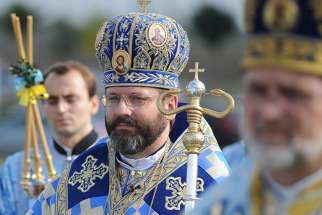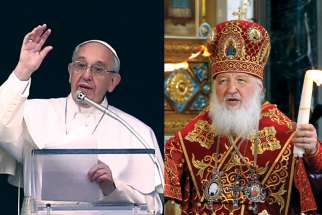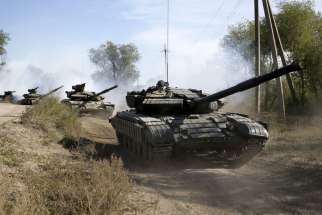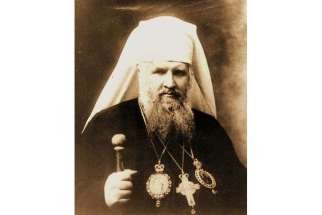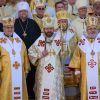Head of Ukrainian Catholic Church consoled by Pope's words
ROME - The head of the Ukrainian Catholic Church said he was consoled by Pope Francis' words of understanding and tenderness after he expressed the disappointment of Ukrainians with a joint declaration signed by the Pope and the Russian Orthodox patriarch.
Ukrainians: don’t throw us under the bus
Nobody wants the Pope to meet Moscow’s Orthodox patriarch more than the Ukrainian Catholics, but the Eastern-rite Catholics want to be sure their Church is treated as a full partner in the dialogue between Rome and Moscow.
VIENNA - The head of the Ukrainian Catholic Church has urged the Vatican to show greater support for his country, as a senior Vatican diplomat warned the country risked becoming "a kind of Somalia."
Pope declares Ukrainian church leader 'venerable'
VATICAN CITY - Pope Francis has signed a decree declaring "venerable" Metropolitan Andrey Sheptytsky, who led the Ukrainian Catholic Church in the tumultuous period of both world wars and at the beginning of Soviet occupation.
Pope Francis marks Ukrainian Independence Day, prays for peace
VATICAN CITY - Pope Francis lamented "tension and conflict" in Ukraine and prayed for "peace and tranquility" there on the country's Independence Day.
Out of the Holodomor rises a stronger Church
Few Ukrainians are thankful for Josef Stalin. In 1932-33 the Soviet dictator starved about six million Ukrainians to death in a planned genocidal famine known as the Holodomor.
But the new bishop for Ukrainian Catholics in France, Switzerland, Luxembourg, Belgium and the Netherlands has one good thing to say about Uncle Joe.
“Stalin aided the future missions by deporting people to Siberia, to Kazakhstan, to different corners of the vast expanse of the Soviet Union. There now, through descendants of the political prisoners and deportees, the Greek Catholic Church is slowly developing its mission — which of course is open to all people of good will who might be attracted to the Church,”
Bishop Borys Gudziak said as he passed through Toronto on a tour of Ukrainian communities in North America.
It’s a bit like thanking Satan for making Christ’s incarnation and resurrection necessary.
The Byzantine Rite Catholic Church in Ukraine survived three generations of often horrific martyrdom. For this Church to survive at all is one of the great accomplishments of the 20th century, said the Harvard-educated historian.
“Ukrainians are a post-traumatic people. They’ve had a toxic degree of trauma in the 20th century,” he said. “Seventeen million Ukrainians were killed in the 20th century.”
For three generations Ukraine was under occupation, kept in line by the highest concentration of KGB agents, informants and collaborators in the Soviet Union.
“People lived in fear,” said Gudziak. “Fear is never something that really opens people up. You sort of close in on yourself.”
But a closed-in, self-absorbed, defensive Church is not what the Syracuse, N.Y.-born son of immigrants has found in Ukraine. Within Ukraine, the Greek Catholics have become a beacon on a hill proclaiming openness and democracy, decrying corruption and authoritarianism. Particularly under Cardinal Lubomyr Husar, they have demanded a different future for their country.
“The Greek Catholic Church today is a Church of the martyrs. At the same time it’s a Church that’s favoured by intellectuals, young people, urbane businessmen and women who want Ukrainian society to change — rule of law to become the style of the country,” he said. “Since the Greek Catholic Church did not compromise with the regime, it emerged from the catacombs with incredible, relatively speaking, moral authority.”
As rector of the Ukrainian Catholic University in Lviv for the past 12 years, Gudziak has built this tiny university into a democratic island of free and open debate. Officers of the SBU, Ukraine’s security service, came visiting in 2010. They asked Gudziak to keep his students away from protesting a newly authoritarian government with ties to Moscow. Gudziak not only refused, he told everybody about the visit.
“The Church is actually quite free in Ukraine, limited only by its imagination. The Ukrainian Catholic University is itself witness to this,” said Ukrainian-Canadian Jesuit Father David Nazar in an e-mail to The Catholic Register.
Nazar describes Gudziak as a “high-end dreamer.” For Gudziak, being Christian means sharing those dreams. To follow a God who in Christ seeks the human means offering a fully human experience of God to the world without preconditions.
“Jesus really brings to us a call to a radical openness. It’s a going to the other,” he said. “My hope is that the radical deprivations Christians endured and in many ways still face in the former Soviet Union will be a place where the faith is forged.”
That martyrdom and oppression should be the forge for openness, charity, joy and hope is unexpected, and perhaps too much to ask. But over the past 25 years Gudziak’s Church has been witness to miracles.
“The intoxicating and exhilarating but often overwhelming change in society for the Church is now only in some ways settling, if you can say that any culture has settled in the first decades of the 21st century,” Gudziak said.
Gudziak will be enthroned as Apostolic Exarch at Notre Dame Cathedral in Paris Dec. 2.
Ukrainian Catholic bishops in Winnipeg to discuss next steps in vibrant-parish plan
WINNIPEG - Ukrainian Catholic bishops from around the world gathered in Winnipeg to discuss how to make their parishes more vibrant — especially through the involvement of laypeople.How they do that requires solutions as varied as the parishes that represent more than four million Ukrainian Catholics on four continents.
"We have parishes that are growing" and need pastoral, financial and structural support, said Bishop Ken Nowakowski of New Westminster, B.C., who heads the Ukrainian Catholic Church's implementation team for its strategic plan, "Vision 2020."
Some urban parishes have an aging population and declining numbers, and synod members must decide how to support the parish priest who spends so much time visiting the sick and officiating at funerals, said Nowakowski. At the other end of the spectrum, the bishops must consider how to help keep priests in busy, large parishes from burning out.
The vibrant parish initiative was approved by the synod in 2011 when the bishops met in Brazil. Their first steps have included making sure that clergy understand the plan and representatives of each of the Ukrainian Catholic eparchies, or dioceses, designated a priest-representative to help introduce the plan within the diocese.
Nowakowski said that about 70 per cent of the world's 4,500 Ukrainian Catholic priests have given feedback and are involved with the plan. This year Church leaders hope to involve religious communities and monastics, he said. He told Catholic News Service he would present synod members with a report on what has been accomplished and would include feedback. Synod members will either ask the committee to continue with its current plan or make changes, he added.
The Synod of Bishops, the Ukrainian Catholic Church's governing body, normally meets in Ukraine, but it is meeting in Canada Sept. 9-16 in honour of the centenary of the arrival of Canada's first Ukrainian Catholic bishop, Blessed Nykyta Budka.
Winnipeg's Ukrainian Archbishop Lawrence Huculak said as bishops from other countries arrived for the synod, they were impressed with the involvement of Canada's laity. Even the synod's organizational committee has laypeople on it, he said.
"It's not just the bishops ... the people are taking part and helping to organize it," he said.
Ukrainian Catholics in Canada have women's, men's and youth groups. Lay groups have national conventions, elect leaders and participate in the life of the Church.
"Although we (Canadians) may take it for granted, our laity have not been able to organize themselves in the same way" in some other countries, he said.
Last December, the head of the Ukrainian Catholic Church, Archbishop Sviatoslav Shevchuk of Kiev-Halych, Ukraine, outlined his vision in a pastoral letter to Ukrainian Catholics worldwide. In the letter, "The Vibrant Parish — A Place to Encounter the Living Christ," he spoke of the elements needed to "grow in holiness and unity in Christ Jesus."
Shevchuk said people of all ages must continue to learn about the faith — not only from the Bible, but also from the Catechism of the Catholic Church. Priests must teach and laity have a responsibility to learn because "permanent and continuous formation for various age groups ... is an essential component of the vibrant parish."
Parishioners must participate regularly in the sacraments, and families must once again become "a school of prayer," he said.
"Our parishes can become places where care is given to the orphan, protection for the widow, help for the poor, and where the suffering of the sick is shared," he said.
Parishes must have active pastoral and parish councils as well as "well-formed and mature co-workers who assist the priest in leading catechetical schools, church brotherhoods, charitable works, youth organizations and prayer groups," he said. "One of the most important responsibilities of leadership in the parish community is discerning God's will and searching for the best ways of implementing it in the life of the parish."
Everyone in the parish must have a missionary spirit, he said.


